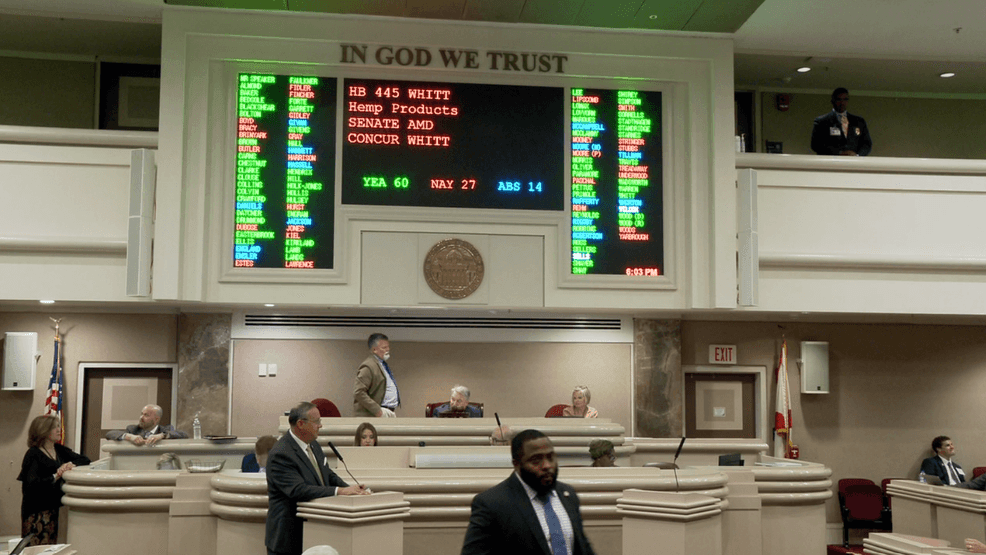A bill regulating the manufacturing, wholesale distribution, and retail sale of consumable hemp products containing THC or CBD is headed to Governor Kay Ivey for her signature. While supporters of House Bill 445 said regulation was needed to protect Alabamians, especially children, supporters of the hemp industry believed it would negatively impact good businesses in the state.
Tuesday, the Alabama House of Representatives concurred with changes made by the Alabama Senate to HB445.
The bill sponsor, Rep. Andy Whitt, R-Harvest, said the most significant Senate alternations included increasing the amount of THC in a single serving from five milligrams to 10 milligrams. A second change would allow large grocery stores to sell products in specific locations that minors could not access.
“Soon, 14,000 square foot grocery stores that have basically a store inside a store will be allowed to sell THC-infused beverages. Water basically. There will be a dedicated salesperson for that,” Whitt said.
Other eligible retail locations include businesses with a valid retail liquor license for off-premise consumption, standalone locations that sell only consumable hemp products, and pharmacies.
HB445 would put the Alabama Alcoholic Beverage Control (ABC) Board in charge of licensing for hemp THC or CBD manufacturers, wholesale distributors, and retailers. The Board could not issue a license to a business unless the local governing body of the county or municipality where the business is located approves the application.
The sale of products to people under 21 years old is prohibited, which is currently the law.
The legislation would also:
establish penalties for selling products to a minorrequire specific labeling and testing requirements for productsprohibit the sale of any smokable hemp productsbans psychoactive cannabinoids created by chemical synthesis, modification, or chemical conversion of another cannabinoidimpose an excise tax of 10% on the retail sales price of consumable hemp productsdisperse revenue to the State General Fund and local governments create the Consumable Hemp Product Compliance Fund with money from filing fees, annual license fees, and labeling approval fees to provide for the Board’s administration and enforcement costsprovide penalties for selling products without a license or selling to underage customersauthorize the Board to seize unlawful hemp products without a warrantrepeal the state law allowing the sale of psychoactive cannabinoids to adultsprevent the sale of products for on-premises consumptionprevent the sale of hemp products through a vending machine or other self-service display and payment system
“It has really been a wild west mentality since the 2018 Farm Bill was passed. Today, we reeled in those illegal elements that have been plaguing our communities, our students, and our high schools,” Whitt said.
READ BILL HERE:
Rep. Napoleon Bracy, D-Prichard, opposed the bill. He believed there should be more focus on punishing people who are selling to people under 21.
“We know who the people are that are selling these gummies to kids. We know who they are. Let’s go get them. Let’s go arrest them. Let’s don’t just cross the Board and take away opportunity for everyone,” Bracy said. “We are not holding the bad actors accountable. What we are doing is punishing the people who are responsible business owners in the state.”
“I don’t want to punish anyone that is doing it right. I can tell you without this bill, there is no teeth to actually go in and do any of the raids or anything because no one is overseeing this product today,” Whitt responded.
If Gov. Ivey signed the bill, it would be illegal to sell consumable hemp without a license starting January 1, 2026.
A bill regulating the manufacturing, wholesale distribution, and retail sale of consumable hemp products containing THC or CBD is headed to Governor Kay Ivey fo Read More


